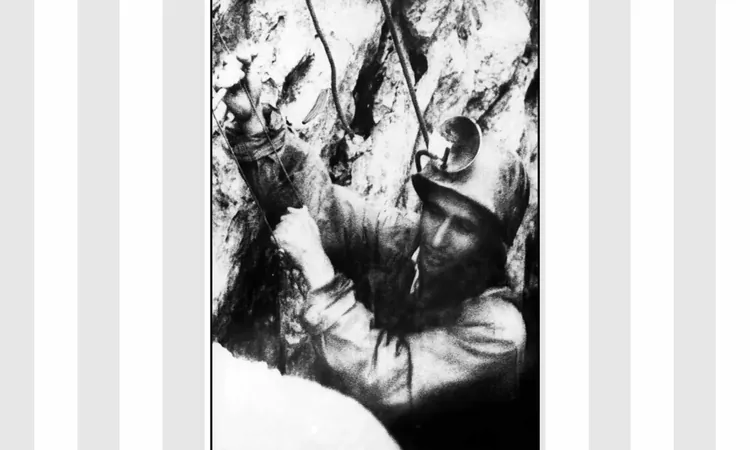
The Extraordinary Journey of a Geologist Who Uncovered Our 'Internal Clock'
2025-05-25
Author: Chun
In a remarkable experiment, geologist Michel Siffre from the Sorbonne spent an astonishing 63 days trapped in a dark, icy cave, completely cut off from clocks, sunlight, and human interaction. When he finally resurfaced, he found his grasp on time had unraveled in ways he never anticipated.
Siffre's groundbreaking experience opened a new frontier in chronobiology, the study of how living organisms regulate their internal timing.
A Bold Exploration
Originally intending to spend just 15 days underground studying a glacier, Siffre quickly realized that this time frame was insufficient. Embracing a challenge, he pushed the envelope, residing in the underground for over two months, relying solely on basic supplies and completely devoid of any timekeeping devices.
"You have to understand, I was a geologist by training," Siffre remarked, emphasizing how he stripped away all external indicators of time, focusing solely on his daily activities without concern for the outside world's rhythm.
Revealing the Internal Clock
One of his most astonishing discoveries was the realization that humans possess an internal timer that continues to tick independently. Severed from the cues of sunrise, societal schedules, and daily routines, Siffre's internal clock drifted far beyond the ordinary 24-hour cycle.
"Without knowing it, I created the field of human chronobiology," he explained. His absence from external stimuli revealed that our biological rhythms don't always align with the Earth's day-night cycle.
The Body’s Clock in Isolation
Others who followed in Siffre’s footsteps, sometimes working alongside him, reported similar phenomena. Their sleep-wake cycles elongated dramatically, with some experiencing bizarre patterns such as sleeping for 33 hours straight or staying awake for a staggering 72 hours.
In one alarming instance, a test subject monitoring his sleep failed to move for over a day, leading researchers to believe he could be dead.
Growing Interest in Internal Clock Discoveries
As the Cold War heated up, NASA grew increasingly interested in how astronauts could manage time shifts away from Earth. Similarly, military programs began to explore best practices for submariners who spent transitory periods in the darkness.
Research findings revealed unique challenges posed by prolonged wakefulness and rest periods, garnering swift support for further investigation into the effects of severing typical time cues. NASA's involvement highlighted the immediate relevance of Siffre’s discoveries.
Significance in Contemporary Science
Today, researchers continue to investigate how irregular sleep patterns can disrupt hormone production, mood stability, and even immune responses.
Understanding these natural biological cycles has proven valuable, especially for shift workers, guiding strategies to minimize fatigue. Some studies even suggest that out-of-sync body clocks correlate with elevated health risks.
In 2017, the Nobel Prize was awarded for breakthroughs in the genetics behind circadian rhythms, acknowledging the profound groundwork laid by pioneers like Siffre.
Criticism and Caution
From the start, Siffre’s methods sparked debate. Critics labeled his approach as reckless or overly dramatic, while others raised concerns about the psychological stress of prolonged isolation. Additionally, questions arose regarding the potential impact of human presence on fragile underground ecosystems.
Siffre's Enduring Legacy
Despite the controversies, Siffre’s work gained traction, as it shed light on how humans adapt in the absence of time cues. This provided important insights into the biological mechanisms underpinning health and performance.
He showcased how our patterns of rest and activity can substantially diverge from the familiar 24-hour day, revealing the resilience of human beings when stripped of conventional signals.
Reflection on Exploration
Siffre's journey illuminated the notion that stepping back from timekeeping devices goes beyond merely missing appointments; it highlighted the power of our inner timing mechanisms, which persist even when we are unaware.
These innovations paved the way for further studies on how biological rhythms change during space missions or travel disruptions. The insights gained could help alleviate the struggles associated with unusual work schedules and minimize mental fatigue, potentially reducing the risk of health issues.
Never did Siffre imagine that his venture into the depths would unlock profound insights into humanity's internal clock. His insatiable curiosity and willingness to endure darkness showed us just how much can be learned when we momentarily set aside the glow of daylight.


 Brasil (PT)
Brasil (PT)
 Canada (EN)
Canada (EN)
 Chile (ES)
Chile (ES)
 Česko (CS)
Česko (CS)
 대한민국 (KO)
대한민국 (KO)
 España (ES)
España (ES)
 France (FR)
France (FR)
 Hong Kong (EN)
Hong Kong (EN)
 Italia (IT)
Italia (IT)
 日本 (JA)
日本 (JA)
 Magyarország (HU)
Magyarország (HU)
 Norge (NO)
Norge (NO)
 Polska (PL)
Polska (PL)
 Schweiz (DE)
Schweiz (DE)
 Singapore (EN)
Singapore (EN)
 Sverige (SV)
Sverige (SV)
 Suomi (FI)
Suomi (FI)
 Türkiye (TR)
Türkiye (TR)
 الإمارات العربية المتحدة (AR)
الإمارات العربية المتحدة (AR)